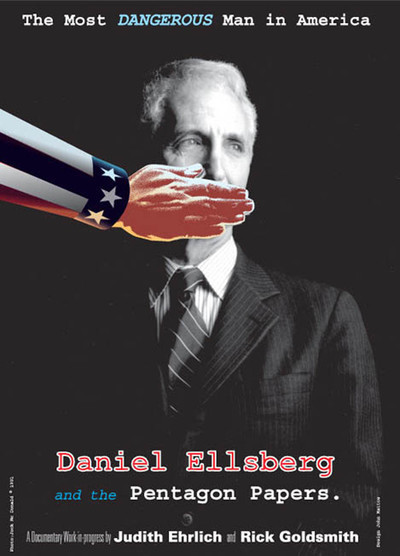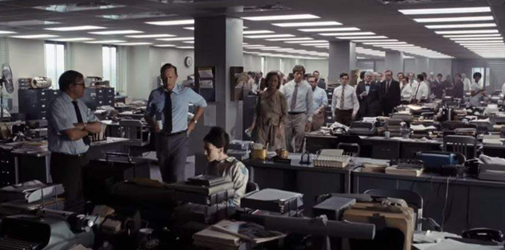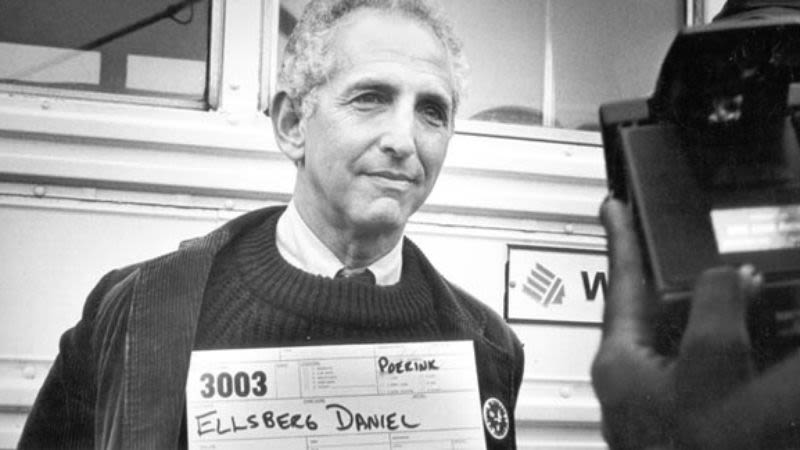Doc Corner: 'The Most Dangerous Man in America' Goes Where 'The Post' Doesn't
 Tuesday, February 20, 2018 at 5:30PM
Tuesday, February 20, 2018 at 5:30PM By Glenn Dunks

If The Post gave you a hankering for the truth behind the Pentagon Papers, then the 2010 documentary The Most Dangerous Man in America: Daniel Ellsberg and the Pentagon Papers will prove uncommonly fulfilling. In fact, watching this Academy Award-nominated doc (it lost to The Cove), you would be hard-pressed to believe that it's about the same events as portrayed in the Steven Spielberg movie.
Last week we looked at The Price of Gold and how closedly I, Tonya mimicked it, so it's actually quite amusing to see that this week's Best Picture / Documentary cross-over is the complete opposite. Sure, they overlap here and cross-over there, but The Most Dangerous Man in America goes longer, deeper, wider, and somehow all but completely ignores The Washington Post and the personalities within the 2017 film...
It’s remarkable, actually, although perhaps it shouldn't be surprising. There had been rumblings by the likes of The New York Times that everybody else had been erased from Ellsberg’s whistleblower story. Unless I missed it, The Washington Post is not mentioned by name once; likewise, neither are Ben Bradlee (as played by Tom Hanks in The Post) and Kay Graham (Meryl Streep).
 THE POST looked at the same story but through the lens of what was happening at The Washington Post.
THE POST looked at the same story but through the lens of what was happening at The Washington Post.
“United States-Vietnam Relations 1945-1967: A Study Prepared by the Department of Defence” is the full name given to the 7000-page document that came to be more commonly called The Pentagon Papers, and in Judith Ehrlich and Rich Goldsmith’s compelling film, the audience is taken on the life story of Daniel Ellsberg. A proud Marine who ultimately came to believe (quite rightfully) that the American government – first by President Truman, and then President Johnson and then furthermore by President Nixon – was being mislead about the country’s involvement in the Vietnam War. Ellsberg appears on screen, telling stories about the death of his mother and sister in a car accident, his time in the war, and then the detailed path he took to releasing the papers including minor anecdotes (the policeman who unwittingly stumbled upon his operation for instance) and major milestones.
Considering the title, it should not come as a surprise that Ellsberg is the primary narrative force behind the movie. With so many years now gone, it’s hard to judge Ehrlich and Goldsmith for not offering up anything of a rebuttal by anybody and nothing in the way of criticism of Ellsberg’s actions. It’s not exactly something that’s up for debate, although in this day and age I am sure there are people out there who don’t take history’s word for anything. I could have done without the crude animations, especially as Ellsberg’s face is such a captivating one to watch as he does the simple task of being a talking head.

Watching this film in 2018 with The Post so fresh in the mind, however, is a particularly unique experience. The documentary helps flesh out many of the exterior strands of the story that Spielberg’s film left out (deliberately). While the Post Graham and Bradlee aren’t mentioned, people who have seen The Post will recognise moments in time: the airplane conversation between Robert McNamara and Ellsberg that is narrated here over still images was recreated with actors Bruce Greenwood as McNamara and Matthew Rhys as Ellsberg in The Post, Ben Bagdikian (portrayed by Bob Odenkirk in The Post) and the Washington Post’s connection to Ellsberg, appears as a brief talking head, detailing the efforts made to secure the documents for his newspaper.
The Most Dangerous Man in America came out just seven years ago and it is amazing to watch it and realize that in that relatively short amount of time the documentary landscape has changed dramatically. It’s hard to picture a film like this being nominated for an Oscar today, given that it errs so strictly to a traditional documentary structure. But that’s neither here nor there, really, and I found myself enraptured once more by the story of the Pentagon Papers in a completely different way than The Post so recently provided.



Reader Comments (2)
Thanks for this post. Is this documentary streaming somewhere?
Hi Tom, it's actually sneakily available on YouTube! Although I watched it on Kanopy.